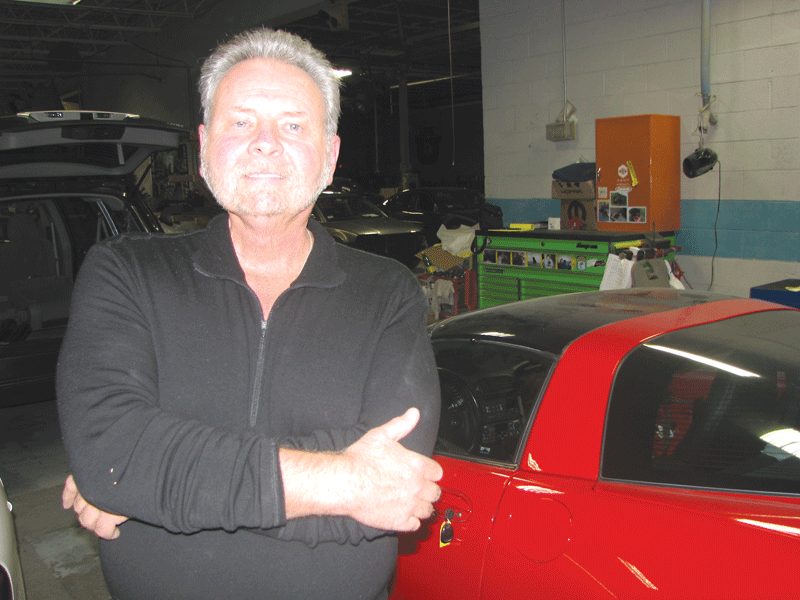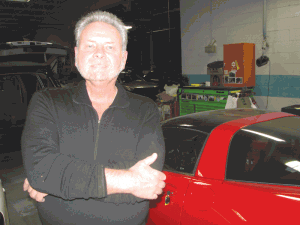
Profiles in Business
Success in His Chosen Field Was No Accident
Rick Recor was recalling his early days as an entrepreneur, more than 35 years ago, when he hung out his shingle in the highly competitive world of auto-body work.When asked if that venture, like the current operation on Pasco Road, put his first name over the door, he had to pause and think.
“You know … it was so long ago, I don’t even remember,” he told BusinessWest. “It must have, because I don’t recall ever naming it anything else. But when I look back, I don’t think it even had a name; I was doing almost exclusively wholesale at the time.”
So you might say that both Recor and his operation have made names for themselves in this business — and well outside it — over the past four decades. Indeed, by most standards, Rick’s has become one of the more well-known and established brands in the region, an accomplishment made possible by everything from heavy repeat business to a highly orchestrated billboard campaign that continues today, although on a much smaller scale than 10 years ago.
And now, as then, Recor is heavily involved with even the most minute of details involving all facets of this business, something he believes casual observers of his enterprise probably don’t know or understand.
“I’m not out on some island like Tahiti, which is what some people think,” he said. “I’m out there [in the shop] on production, every day. I look at every car before it goes off for delivery, and I look at it during the repair process, as well. I’m in here six days a week, and working hard; I have to — that’s the nature of this business.”
From very humble beginnings — a business with no name and just a few customers — Recor has grown his venture into one of the largest of its kind in the region, one with 40 employees, and maybe 100 cars in the shop at any given time. Rick’s will handle more than 3,000 jobs in a typical year.
Much has changed since those early days. “When I first started, it took two people to take a bumper off a car. That’s how much one weighed, maybe 200 or 300 pounds — they were all chrome; now, you can do it with one finger because everything is so light for fuel economy,” Ricor noted, citing just one example.
But the basics haven’t changed, he continued, listing solid customer service, attention to detail, and the need to generate business volume as just some of the things in that category.
For this, the latest installment in its Profiles in Business series, BusinessWest chronicles the winding road Recor took to this point in his life and career, and in the process gets a crash course in the auto-body business.
Scratching the Surface
As he talked about the ins and outs of his chosen field, Recor made repeated reference to a red Corvette parked in the back corner of the huge garage. Much of the front end had had been stripped off, and the hood was gone, revealing the powerful engine.
“The ‘BP’ written on the windshield stands for ‘blueprint,’” said Recor, referring to the battle plan for returning the car to its pre-mishap condition and the name of the technician who will carry it out — written next to those two letters. The BP follows the disassembly, or tear down, of the damaged portions of a vehicle, a process followed by the cataloguing, ordering, and checking of replacement parts, sequential steps that are carried out methodically to avoid having to do things twice, a very high priority given the low margins shop owners work under in this state (more on that later).
Recor said he gets involved in each of these steps and others that follow, including paint-shop work and final inspection before the car goes back to its owner, a regimen he describes as “orchestrating” each and every job that comes into the shop, including the longest and most expensive project to date — repairs to a Mercedes that totaled $68,000.
“There were more than 300 parts involved with that one job, when you count every nut and clip,” he said, adding that he inspected every step in that endeavor, as he has with every job, right down to a simple fender replacement.
Aside from the six months he was being treated for and recovering from throat cancer in 2005, this is the way it’s been for Recor since he first entered the world of auto body work after dropping out of high school in the early ’70s.
He started with sanding and taping duties for Boston Road Motors in Springfield, for which his father sold used cars. Later, he went to work for Central Chevrolet in West Springfield, where he painted cars and started the progression from employee to employer.
“I mentioned to (owner) Floyd Voke that I could paint a lot more cars if I had some people helping me,” he recalled. “He said that, if I split the ticket, split the compensation, I could hire people. So I did, I hired two people. They prepped the cars and I painted them, and I worked til 10 o’clock at night.”
After painting cars for a few other area dealers, he decided, in 1974, that it was time to go into business for himself.
He set up shop in a one-car garage behind Millie’s Pierogi on Broadway Street in Chicopee, and started doing work for a few auto dealers in the area.
He steadily added customers and, with his name now on the signs and work orders, grew the business into progressively larger garages. In 1997, he moved into a 40,000-square-foot facility on Pasco Road that was formerly home to Grossman’s Lumber. There, he now manages a truly family business.
Indeed, his wife, Mari Tarpinian, a long-time travel-bureau employee who was downsized when that industry shrank, joined Rick’s several years ago. She’s responsible for marketing and human resources, and handled most all of the myriad logistics, including the rugged permitting process, involved with getting the new digital sign now outside the business up and running.
Meanwhile, Recor’s sister-in-law, Susan, is the office manager, and his father-in-law, Leo, now in his 80s, picks up and drops off customers and “chases parts,” among other duties.
Not officially family members, but certainly critical to the organization, are the 40 or so other employees, said Recor, noting that many have been with him for two decades or more.
Framework for Success
As he gave BusinessWest a tour of the many departments within the sprawling shop, Recor would occasionally stop at a car, reach in an open window, pull the work order off the dashboard, and point to the line at the bottom of the page where it lists who referred the customer in question.
In each case, and not coincidentally — remember, he knows practically everything about each car in the garage — the words ‘return customer’ were stamped onto that line.
“Repeat business is very important in this field,” he explained while reaching into another window. “We have to generate volume, and to do that, we have to give people reasons to come back, not look somewhere else the next time.”
Elaborating, Recor said that he and all other players in this sector are continually challenged by the hourly rates that insurance companies are willing to pay for work done. Those rates average perhaps $37 per hour, he continued, and with the highly skilled workers he employs and his considerable overhead, there is literally no margin for error.
“We’re working with the lowest labor rate in the country, which makes it very hard to make a profit,” he explained. “To be profitable you have to be as efficient as possible, and you need to be as thorough as possible, because there’s no time to do anything twice.”
While discussing his business and how he handles its many challenges, Recor had to clear his throat often, and took repeated hits off a bottle of water. The dryness is one of the lingering effects of his throat cancer; another was the loss of roughly half his hearing.
He described his course of treatment and recovery as the most difficult time of his career, when he was left with no choice but to relinquish his orchestration duties and let someone else supervise the shop.
“It was hard, but you seem to forget about work when your health is an issue,” he explained. “It just not that important anymore.”
These days, work is paramount again, and, as always, Recor is singularly focused on the 60 or 70 cars that are in his shop and in various stages of repair. He said he enjoys riding his motorcycle when the weather allows, and likes to get away to New York City with Mari. But his first love appears to be his orchestrating at the shop. Which is good, because he’s at it maybe 60 hours a week.
“The best part of my job is that I still love what I do, and to me, that’s everything,” he said. “I’m usually one of the first people here, and I’m the last one to leave. I like it that way.”
Now 58, Recor said that while at various points in his career he thought about possibly expanding and opening multiple locations, he is content with his one shop.
“It’s too late in the game for me now; it’s always been my dream to be where I’m at, but it just took too long to get there,” he said, adding that the logistical difficulties of major expansion, as well as the problems he would have finding enough qualified help, have stifled those ambitions.
But looking back over 35 years, he can say that he’s certainly enjoyed this ride, and there are many miles still to travel.
George O’Brien can be reached at
[email protected]






